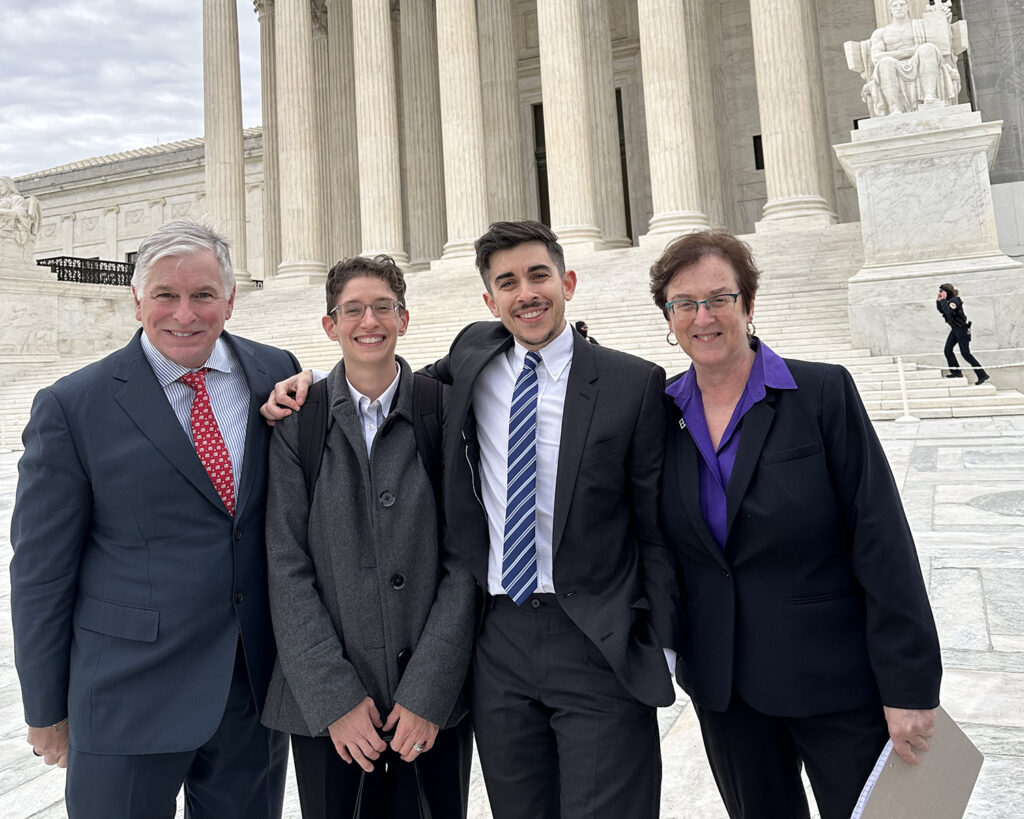By Jenny Pizer, Lambda Legal Chief Legal Officer
Yesterday, we provided oral arguments to the U.S. Supreme Court in L.W. v. Skrmetti (also known as United States v. Skrmetti), our challenge with the ACLU to Tennessee’s ban on best practice medical care for transgender youth who suffer from gender dysphoria. This health care is safe, effective, and can be lifesaving. And Tennessee’s ban of this care is discriminatory and cruel. Making the case against this kind of bigotry is core to Lambda Legal’s mission — to defend and to educate against anti-LGBTQ+ prejudice.
That’s why we have been so proud to represent the plaintiffs in this case — the brave families and a remarkable physician who have stepped forward to tell the courts, and yesterday the Supreme Court, about the terrible impacts this law is having on parents and trans young people across Tennessee.
Lifting these stories is essential to driving the change needed to safeguard the lives and futures of these youth, and of our entire community. And lift them we did!
While our legal team was inside presenting oral arguments, our supporters showed up in large numbers at the steps of the Court for our Freedom to Be Ourselves rally in solidarity with transgender young people nationwide.
We heard from remarkable speakers including community leaders and attorneys who have been fighting tenaciously for the rights and dignity of transgender and nonbinary youth.
And this joyous, passionate showing of support was especially inspiring there, directly in front of the Supreme Court building, where the inscription above the main entrance declares: Equal Justice Under Law.
That is the Court’s ultimate responsibility, and it’s why we prepare so intensely to present our legal arguments about constitutional doctrine together with the context of our clients’ lives and our community’s history.
These arguments were exceptionally well presented yesterday. In two historic firsts, our community was represented by the Solicitor General of the United States, Elizabeth Prelogar, and by an openly transgender lawyer, Chase Strangio, our co-counsel at the ACLU. And in a welcome reflection of the progress we are making as a movement, the questioning by all of the justices was respectful even when indicating disagreement with our position. Given the open contempt we have heard in some prior cases, that was a huge relief to me.
Instead of contempt, we heard important exchanges showing the starkly contrasting views among members of the Court. Where the Chief Justice and Justice Kavanaugh repeatedly suggested there should be deference to the Tennessee legislature because medical care involves technical information and evolving knowledge, Justice Jackson brilliantly pressed that the Equal Protection Clause is about requiring justification when legislatures classify people in ways that align with majoritarian prejudices.
And yet, while the right-wing cast of the current Court creates challenges for all our cases, there is reason to be hopeful after yesterday’s arguments. The question before the Court is whether Tennessee’s healthcare ban treats people differently based on sex. The answer will determine whether states need good reasons for these laws, or whether there will be little check on the bigoted will of legislatures coast-to-coast.
So, General Prelogar stressed that this law has the sex-based classification on its face. It states that its purpose is “encouraging minors to appreciate their sex” and not be “disdainful of their sex.” When Tennessee’s lawyer claimed that the law is for distinguishing among different medical problems, Justice Elena Kagan retorted: “The whole thing is imbued with sex. I mean, it’s based on sex. … it’s a dodge to say … it’s based on medical purpose, when the medical purpose is utterly and entirely about sex.”
Questions from Justice Amy Coney Barrett give an additional reason for hope. She asked repeatedly, apparently with genuine curiosity, about whether transgender people have been subject to discrimination historically. This concerns whether laws that discriminate against transgender people should receive more rigorous constitutional testing. And Chase Strangio was clear and direct in confirming that ignominious history by citing the widespread criminal laws against cross-dressing and bans on military service.
There was one Cheshire Cat on the bench yesterday — Justice Neil Gorsuch. His declining to ask even one question during the two and a half hours of argument was both uncharacteristic and intriguing because he authored the recent Court decision agreeing that discrimination based on gender identity (or sexual orientation) is sex discrimination.
And so, we wait. The Court will issue its decision by the end of June or early July next year. Until then, we continue our advocacy in courts and before public bodies nationwide to defend LGBTQ+ people, everyone living with HIV, and especially the trans and nonbinary young people being so wrongfully targeted in these challenging times. Thank you for being with us as we amplify our demand for Equal Justice Under Law.
For more about U.S. v. Skrmetti, read our F.A.Q. on the case.

